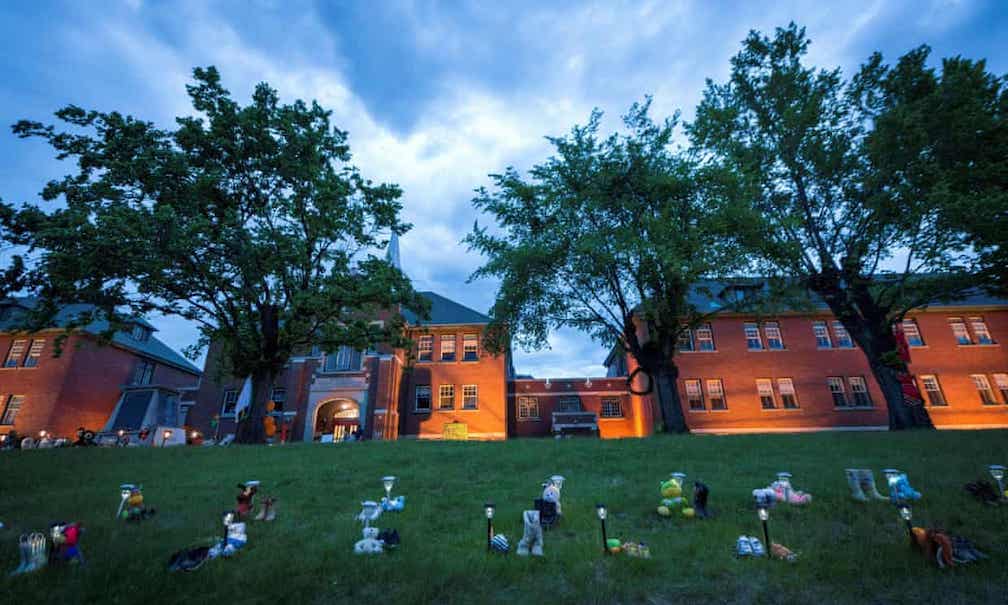Canada calls on pope to apologize after Indigenous children’s remains found

Government urges apology for role Catholic church played in residential school system after remains of 215 children discovered
Canada’s government has called on Pope Francis to issue a formal apology for the role the Catholic church played in Canada’s residential school system, days after the remains of 215 children were located at what was once the country’s largest such school.
Justin Trudeau’s government also pledged again to support efforts to find more unmarked graves at the former residential schools which held Indigenous children taken from families across the nation.
Chief Rosanne Casimir of the Tk’emlups te Secwepemc First Nation in British Columbia has said the remains of 215 children were confirmed last month at the school in Kamloops, British Columbia, with the help of ground-penetrating radar. So far none has been excavated.
The Kamloops Indian Residential school was Canada’s largest such facility and was operated by the Roman Catholic church between 1890 and 1969 before the federal government took it over as a day school until 1978, when it was closed. Nearly three-quarters of the 130 schools were run by Catholic missionary congregations.
A papal apology was one of the 94 recommendations made by the Truth and Reconciliation Commission, which was set up as part of a government apology and settlement over the schools, and the prime minister asked the pope to consider such a gesture during a visit to the Vatican in 2017.
The Canadian Conference of Catholic Bishops announced in 2018 that the pope could not personally apologize for residential schools, even though he has not shied away from recognizing injustices faced by Indigenous people around the world.
“I think it is shameful that it hasn’t been done to date,” Marc Miller, Indigenous services minister, said.
“There is a responsibility that lies squarely on the shoulders” on the Catholic bishops of Canada, he added.
Carolyn Bennett, Indigenous relations minister, added that an apology by the pope would help those who suffered heal.
“They want to hear the pope apologize,” she said.
From the 19th century until the 1970s, more than 150,000 First Nations children were required to attend state-funded Christian schools as part of a program to assimilate them into Canadian society. They were forced to convert to Christianity and not allowed to speak their native languages. Many were beaten and verbally abused, and up to 6,000 are said to have died.
The Canadian government apologized in parliament in 2008 and admitted that physical and sexual abuse in the schools was rampant. Many students recalled being beaten for speaking their languages. They also lost touch with their parents and customs.
The prime minister, Justin Trudeau, has said the government will help preserve grave sites and search for potential unmarked burial grounds at other former residential schools. But Trudeau and his ministers have stressed need for Indigenous communities to decide for themselves how they want to proceed.
“We will be there to support every community that wants to do this work,” Bennett said. “We know right now that that work is urgent.”
The government previously announced C$27m (US$22m) for the effort. Bennett called that a first step.
“I know people are eager for answers but we do have to respect the privacy and mourning period of those communities that are collecting their thoughts and putting together protocols on how to honor these children,” Miller said.
Indigenous leaders plan to bring in forensics experts to identify and repatriate the remains of the children found buried on the Kamloops site. Perry Bellegarde, chief of the Assembly of First Nations, spoke with Trudeau this week and urged him to work with First Nations “to find all the unmarked graves of our stolen children”.
Murray Sinclair, the former chair of the reconciliation commission, said more sites will be found.
“We know there are lots of sites similar to Kamloops that are going to come to light in the future. We need to begin to prepare ourselves for that,” Sinclair said.